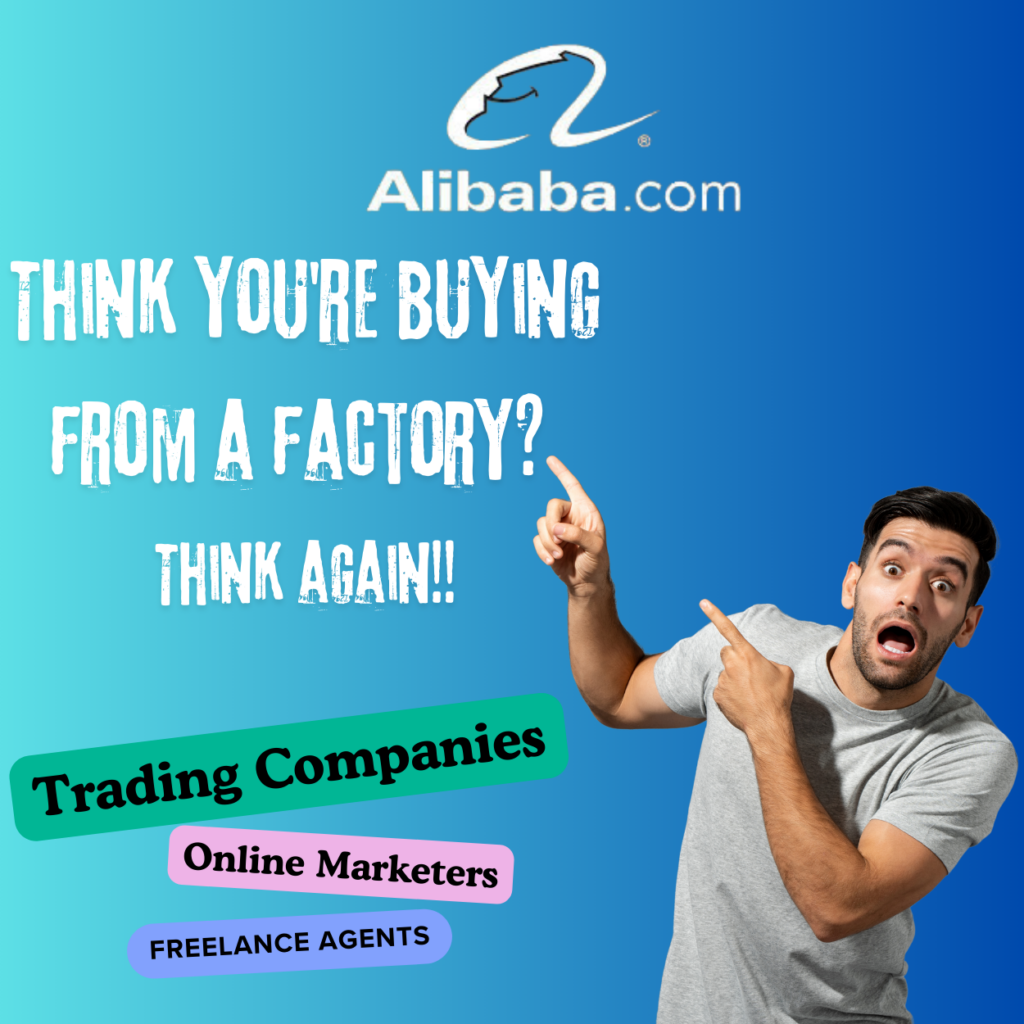The Hidden Realities of Alibaba Sourcing

The Truth About Alibaba Sourcing:
How to Spot Factories vs. Intermediaries
The Complexities of Alibaba Sourcing: Avoiding Common Pitfalls
Many businesses see Alibaba as a quick gateway to factories and competitive pricing. However, not everyone on the platform is a direct manufacturer. Some are trading companies, freelance agents, or online marketers operating under the guise of factories. This often creates confusion for businesses that are looking to streamline their supply chain and cut costs.
While Alibaba is an incredibly useful platform, it’s important to understand that not all suppliers have the same level of control or responsibility over the production process. Trading companies, for instance, act as intermediaries between you and the real manufacturer, which can introduce unnecessary risks, costs, and delays. Freelance agents might seem helpful, but they are often only acting as brokers for a commission, and online marketers typically don’t even have direct relationships with the factories they source from, leading to inconsistencies and potential quality issues.
This guide
will help you identify the different types of suppliers on Alibaba, how to spot genuine manufacturers, and why working directly with factories ensures smoother operations, more reliable products, and lower costs. We’ll also cover the risks of relying on middlemen and how Master Shifu can ensure you’re dealing with the right suppliers every time, eliminating unnecessary intermediaries and their associated costs.
The Reality of Alibaba:
Not Everyone is a Factory
When browsing Alibaba, it’s easy to assume that every supplier listing is a factory. After all, the platform positions itself as a direct link between buyers and manufacturers. But in reality, not everyone on Alibaba is a factory owner or manufacturer.
Many listings are operated by:
1. Trading Companies
These intermediaries act as middlemen between you (the buyer) and the actual factory.
They don’t produce anything themselves but source products from multiple factories and sell them at a markup.
2. Freelance Agents
Some individuals or small teams pose as suppliers but are essentially brokers.
Their job is to connect buyers with factories for a fee.
3. Online Marketers
These are people who buy products in bulk from factories, rebrand them, and list them on Alibaba under their own company name.
They may not even have a physical presence near the factory.
While some trading companies and agents are legitimate and can add value (e.g., quality control, logistics support), many others exist solely to increase costs without providing meaningful benefits.
Why Dealing with Non-Factories Can Be Problematic
Working with intermediaries instead of dealing directly with factories introduces several challenges. These middlemen often have limited oversight of the production process, which can result in inconsistent quality, missed deadlines, and a lack of accountability. As a result, your business may face unexpected costs and delays that could have been avoided by working directly with the manufacturer.
1. Higher Costs
- Middlemen add their profit margins to the product price, meaning you’re paying more than if you dealt directly with the factory.
- Hidden fees can also creep in during negotiations or shipping.
2. Lack of Transparency
- You may not know where your products are truly being manufactured, making it difficult to assess production standards, compliance, or ethical practices.
- If something goes wrong (e.g., defects, delays), you’ll need to go through the intermediary rather than communicating directly with the factory.
3. Limited Customization Options
- Factories are better equipped to handle custom orders, such as unique designs, packaging, or specifications.
- Middlemen might lack the flexibility or technical knowledge to accommodate your needs.
4. Quality Control Risks
- Intermediaries may prioritize cost savings over quality assurance, leading to subpar products.
- Without direct access to the factory, it’s harder to conduct inspections or audits.
5. Communication Barriers
- Working through an intermediary can create communication gaps, misunderstandings, and delays in resolving issues
How to Identify Genuine Factories on Alibaba
1. Check the Supplier’s Profile
- Look for keywords like Manufacturer, Factory, OEM/ODM in their profile description.
- Check their location. Most factories will list specific industrial zones or cities known for manufacturing certain products (e.g., Yiwu for consumer goods, Shenzhen for electronics).
2. Verify Certifications
- Legitimate factories often display certifications relevant to their industry, such as ISO, CE, or FDA approvals.
- Ask for documentation to confirm authenticity.
3. Ask About MOQs (Minimum Order Quantities)
- Factories typically have higher MOQs because they produce goods in large batches.
- If a supplier offers unusually low MOQs, they might be a trading company or reseller.
4. Request a Factory Tour
- A genuine factory should be willing to arrange a virtual tour via video call or invite you to visit their facility in person.
- Be wary of excuses or refusals.
5. Review Product Photos
- Pay attention to product images. Factories usually showcase raw materials, machinery, and production lines in their listings.
- Trading companies tend to focus only on finished products.
6. Contact Multiple Suppliers
- Reach out to multiple suppliers for the same product and compare responses.
- Factories will often provide detailed insights into production processes, while intermediaries may struggle to answer technical questions.
7. Use Alibaba’s Gold Supplier Verification
- Alibaba verifies certain suppliers as “Gold Suppliers.” While this doesn’t guarantee they’re factories, it does indicate they’ve passed background checks and trade assessments.
By combining these strategies with Master Shifu’s on-the-ground verification, Western-managed quality inspections, and full-scale production oversight, you can ensure a seamless sourcing experience with direct access to reliable manufacturers.


Tips for Bypassing Middlemen
and Finding Direct Manufacturers
Once you’ve identified potential factories, here’s how to build strong relationships and avoid unnecessary intermediaries:
 Negotiate Directly
Negotiate Directly
Communicate clearly about your requirements and negotiate pricing directly with the factory.
Avoid relying on third-party translators unless absolutely necessary.
 Hire a Local Sourcing Agent (Optional)
Hire a Local Sourcing Agent (Optional)
If navigating Alibaba feels overwhelming, consider hiring a trusted local sourcing agent based in China.
Unlike random intermediaries, reputable agents can help vet factories, negotiate terms, and oversee production.
 Visit Trade Shows
Visit Trade Shows
Events like the Canton Fair and Global Sources Expo allow you to meet factories face-to-face and establish direct connections.
 Use Third-Party Inspection Services
Use Third-Party Inspection Services
Platforms like Intertek, SGS, or Bureau Veritas can inspect factories and verify their legitimacy before you commit to an order.
 Start Small
Start Small
Begin with a trial order to test the factory’s capabilities and reliability before placing larger orders.
 Be Wary of Unrealistic Promises
Be Wary of Unrealistic Promises
If a supplier claims they can deliver high-quality products at rock-bottom prices, proceed with caution.
This could be a red flag for counterfeit goods or poor-quality items.
Final Takeaway: Empower Yourself as a Smart Buyer
Sourcing on Alibaba can be incredibly rewarding, but it requires diligence and awareness. By understanding the role of intermediaries and learning how to identify genuine factories, you can save money, improve product quality, and streamline your supply chain.
At Master Shifu, we specialize in finding reliable factories, conducting supplier verifications, and managing quality control to ensure that your sourcing experience is smooth and risk-free.
Our Services: A Full-Spectrum Approach to Secure Sourcing
- Direct Factory Access: We work exclusively with direct factories that have been physically verified by our team. We ensure that you’re not dealing with intermediaries but with genuine manufacturers who meet your exacting standards.
- Production and Order Management: From receiving your request to shipping your order to your warehouse, we handle the entire process. This end-to-end management guarantees that what you ordered is exactly what you receive.
- Western-Managed Quality Inspections: Unlike local inspection teams, we provide inspections led by a Western team, ensuring that your products meet international standards. These inspections are done according to a detailed agreement tailored to your specific needs.

Still Have Questions? Let’s Discuss How We Can Help
We’re here to provide the answers you need.



